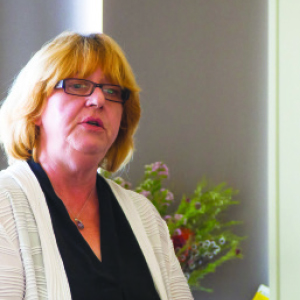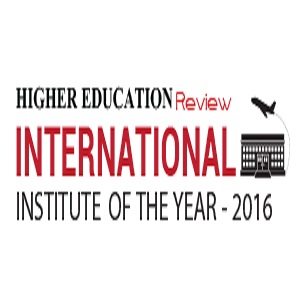Hailing from Patna, India, Saba Nabi and her family decided to move to Australia to further her husband’s education in 2011. Although, Saba had a childhood dream of completing a PhD, all she knew was that a PhD was the highest degree one could achieve and she wanted to do it. Unlike most of the Indian students who choose big Australian cities Sydney, Melbourne or Brisbane to pursue their higher education, Saba moved to Wagga Wagga, a regional city in New South Wales, Australia. The city’s landscape, flora, fauna and greenery appealed to her at the first instance. Moreover, Charles Sturt University (CSU) where Saba decided to do her PhD had all the facilities and expertise to complete her research. At CSU, Australia's largest regional university that is known for its high academic standards and social welfare activities, Saba was exposed to a very different world of learning and community service.
In 2012, Saba became the first international student to be elected to the CSU Council. Since then, as the president of the CSU International Students Association, Saba has been tireless in promoting the interests and raising the profile of international students at the University, as well as the benefits of living in regional Australia. Today, Saba is the new Equity Officer for the Council of International Students Australia (CISA) and she works closely with federal and state government departments, education peak bodies, student organizations, and education providers. “Saba is a perfect example of our international students. As we have a strong presence in the regional areas of Australia, our international as well domestic students can undertake their workplace learning experiences in communities across Australia and overseas, which means they can make a meaningful contribution even as they learn,” says Prof. Heather Cavanagh, Pro Vice- Chancellor, International Education and Partnerships, CSU. Like many Australian universities, CSU holds a rich legacy in education. The University’s origin date back to the establishment of Experimental Farms in Bathurst in 1895 and Wagga Wagga in 1896, and its history includes the development of Teachers Colleges on those sites in Wagga Wagga in 1947 and Bathurst in 1951. The growth and evolution of these institutions led to the formation in 1989 of the CSU and since then, the university has grown to become Australia's largest regional university and the country's leading provider of distance education.
“The overall student experience is what makes CSU different from other universities around the world. ‘Yindyamarra Winhanganha’ is a Wiradjuri phrase meaning, ‘the wisdom of respectfully knowing how to live well in a world worth living in’. It is a sentiment at the heart of our approach to education and reflects our ethos for the public good,” claims Prof. Cavanagh. By encouraging students to work with hospitals, schools, business and not-for-profit organizations, through skills in nursing, teaching, accountancy, animal care or information technology, CSU offers its international students a unique opportunity to help the communities while they develop personally and professionally to become valuable members of the workforce. In addition to that, through CSU Global, the university strives to provide all of their students the opportunity to experience the world through a broad range of international study experiences. CSU has a suite of programs, which have been designed to give students (on campus and studying by distance education) international exposure and a competitive edge in the graduate market.
“CSU has highest employability rate in Australia. Our commitment to hands-on learning means our graduates are ready to contribute from their very first day on the job because they have already seen how things really work in their chosen profession,” opines Prof. Cavanagh. Workplace learning means CSU students are more familiar with the equipment that they will use in their industry, and are used to working with other professionals. Hence, they speak the industry’s language and immediately fit in. Many postgraduate degrees of CSU allow students to bring their career into the classroom, creating business or lesson plans, developing patient skills, or applying scientific discovery to the real world.The University is committed to achieving excellence in education for the professions and to maintaining national leadership in flexible and distance education. While, CSU offers more than 400 industry relevant courses and workplace learning supports learning and teaching objectives of CSU, most of the Indian students choose programs associated with business, accounting and information technology.
“Indian students add lot of value to our university as they are very passionate and they come with immense self confidence. I would suggest our prospective Indian students to join our regional campuses, because that is where they get a genuine Australian education,” concludes Prof. Cavanagh.
In 2012, Saba became the first international student to be elected to the CSU Council. Since then, as the president of the CSU International Students Association, Saba has been tireless in promoting the interests and raising the profile of international students at the University, as well as the benefits of living in regional Australia. Today, Saba is the new Equity Officer for the Council of International Students Australia (CISA) and she works closely with federal and state government departments, education peak bodies, student organizations, and education providers. “Saba is a perfect example of our international students. As we have a strong presence in the regional areas of Australia, our international as well domestic students can undertake their workplace learning experiences in communities across Australia and overseas, which means they can make a meaningful contribution even as they learn,” says Prof. Heather Cavanagh, Pro Vice- Chancellor, International Education and Partnerships, CSU. Like many Australian universities, CSU holds a rich legacy in education. The University’s origin date back to the establishment of Experimental Farms in Bathurst in 1895 and Wagga Wagga in 1896, and its history includes the development of Teachers Colleges on those sites in Wagga Wagga in 1947 and Bathurst in 1951. The growth and evolution of these institutions led to the formation in 1989 of the CSU and since then, the university has grown to become Australia's largest regional university and the country's leading provider of distance education.
“The overall student experience is what makes CSU different from other universities around the world. ‘Yindyamarra Winhanganha’ is a Wiradjuri phrase meaning, ‘the wisdom of respectfully knowing how to live well in a world worth living in’. It is a sentiment at the heart of our approach to education and reflects our ethos for the public good,” claims Prof. Cavanagh. By encouraging students to work with hospitals, schools, business and not-for-profit organizations, through skills in nursing, teaching, accountancy, animal care or information technology, CSU offers its international students a unique opportunity to help the communities while they develop personally and professionally to become valuable members of the workforce. In addition to that, through CSU Global, the university strives to provide all of their students the opportunity to experience the world through a broad range of international study experiences. CSU has a suite of programs, which have been designed to give students (on campus and studying by distance education) international exposure and a competitive edge in the graduate market.
“CSU has highest employability rate in Australia. Our commitment to hands-on learning means our graduates are ready to contribute from their very first day on the job because they have already seen how things really work in their chosen profession,” opines Prof. Cavanagh. Workplace learning means CSU students are more familiar with the equipment that they will use in their industry, and are used to working with other professionals. Hence, they speak the industry’s language and immediately fit in. Many postgraduate degrees of CSU allow students to bring their career into the classroom, creating business or lesson plans, developing patient skills, or applying scientific discovery to the real world.The University is committed to achieving excellence in education for the professions and to maintaining national leadership in flexible and distance education. While, CSU offers more than 400 industry relevant courses and workplace learning supports learning and teaching objectives of CSU, most of the Indian students choose programs associated with business, accounting and information technology.
“Indian students add lot of value to our university as they are very passionate and they come with immense self confidence. I would suggest our prospective Indian students to join our regional campuses, because that is where they get a genuine Australian education,” concludes Prof. Cavanagh.


